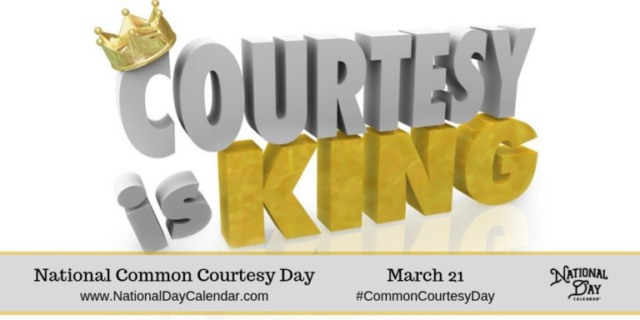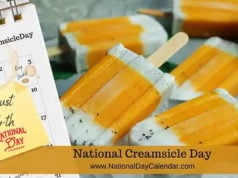
National Common Courtesy Day is observed annually on March 21st. This day brings awareness to how important common courtesy is in our lives.
In the Merriam-Webster dictionary, courtesy is described as a: behavior marked by polished manners or respect for others: courteous behavior b: a courteous and respectful act or expression.
- Common courtesy can be as simple as saying “please” and “thank you” when asking for and receiving a service, gift or assistance. Kindness and courtesy do go a long way and are noticed by others even if you do not realize it.
- Letting someone in front of you in traffic is easy. Hold open a door for someone or give a person a hand with his groceries. Give up your seat on the bus to someone who might need it.
- Introduce yourself to the new employee or kid at school and take the time to introduce them to the rest of the crew.
- If you say, ’I invite you,’ that means you pay. You may say, ’Let’s go to a restaurant,’ and in this case, everyone pays for themselves. If a man offers to pay for a woman, she can agree.
- Don’t put your phone on the table in public. By doing so, you show how important a role this device plays in your life, how bored you are of what’s happening, and that at any moment you’re ready to stop a useless conversation and once again check your Instagram feed, answer an important call, or try new levels in Angry Birds.
- Your shoes should always be clean.
- Avoid meaningless talk on the phone.
- If someone offends you, you shouldn’t return the favor or raise your voice to the person who insulted you. Don’t sink to their level. Just smile and leave the ill-mannered company.
- A man should always walk on a woman’s left-hand side.
- Drivers should remember that puddle-splashing of passers-by is an amoral behavior.
- Nine things should be kept secret: age, wealth, family quarrels, religion, medical problems, love affairs, gifts, honor, and disgrace.
- Whoever you are — a company director, an academician, an elderly woman, or a student — when you enter a room you should be the first person to greet everyone there.
- Covering your mouth when you sneeze or cough is good manners. Using your right hand to do it? That’s bad. “Your right hand is your social hand,” Joy Weaver (Etiquette expert) says. “It should be available for shaking hands, waving, and blowing kisses.”
- You’re wearing your handbag on your right shoulder—and slinging it over the back of your chair. To keep your “social” hand free for greetings, it’s best to keep your handbag — or cocktail! — in your left hand. Note, Queen Elizabeth always keeps her tote on her left. Never place your handbag on the back of a chair when you’re seated at a table. The proper spot, says Weaver, is on the floor to your right.
- You’re applauding incorrectly. The correct way to applaud is just slightly to your left, about chest height.
- Covering Your Mouth To Yawn. In ancient Rome, opening your mouth without protection was just asking for trouble.
- Taking Your Hat Off While Indoors. Ancient knights had to lift their visors to prove that they were nice guys who weren’t looking for a fight, and that’s more or less the reason that wearing hats inside is still frowned upon.
- Saying “Bless You” When Somebody Sneezes. About 1,500 years ago, the “Black Death” swept through Europe and killed about 25 million people, roughly half the world’s population. Pope Gregory I, the Catholic Church pontiff whose predecessor had been forced into early retirement by the plague, was understandably a little nervous about the situation, and so he decreed that when anybody was heard sneezing—one of the first signs that they’d been infected with the plague—they should be told “God bless you.” It was the “thoughts and prayers” of its day.
- Keeping Your Elbows Off the Table. It wasn’t easy getting a seat at a medieval feast, and it wasn’t just a chance to rub shoulders with royalty. It was also an all-you-can-eat buffet unlike anything most people were accustomed to at the time. Putting your elbows on the table meant hogging valuable real estate, and keeping your table neighbors from getting their fair share.
- Wearing Black at Funerals. The Ancient Romans set the precedent for wearing black while in mourning—they had a dark toga called a “Toga Pulla” that was worn for funerals and occasional for protests—and the tradition continued in the Middle Ages in Europe, where black clothes were not just worn to demonstrate your sad feelings but to show off your wealth.
- Long before air conditioning was a thing, people wore lighter colors during the summer to stay cool. So not wearing white after Labor Day wasn’t so much a social rule as a wardrobe suggestion.
- Getting married or having a kid was no guarantee that good things were coming your way. Your future spouse could be taken away with little or no advance warning, and infant mortality rates have been historically staggering. So friends and family would “shower” their loved ones with gifts prior to a big life change, just in case everything went horribly wrong.
- Smiling for photos. You don’t see a lot of smiling faces in early photographs, especially during the Victorian era (much of the 19th century). This is partly because of slow exposure times and poor dental hygiene. Attitudes changed in the 20th century, thanks to Kodak film (which shortened the whole process) and people like President Franklin D. Roosevelt, who is often credited with using “cheese” as a cue for people to smile while being photographed. Why “cheese” of all words? Articulating a long ‘e’ sound causes you to pull back your lips and bare your teeth.
- Leaving a “Tip” For Restaurant Servers. It’s actually an acronym, first coined in British taverns during the 17th Century. If you worried that you wouldn’t get your booze or food in a timely manner, you’d slip the barkeep a T.I.P., short for “to insure promptitude.” The practice is now so common that we debate the percentage of a tip, not whether to give one at all.
- Magic Johnson claims he invented the high-five as a student at Michigan State, but the true creator was Dusty Baker, an outfielder for the LA Dodgers (now a manager for the Washington Nationals), who hit his 30th home run of the season during a 1977 game against the Houston Astros. As he ran towards home plate, his teammate Glenn Burke was so excited that he ran out of the dugout, his hand in the air, and Baker gave it a slap. And so the high five was born.
- The “toast” is pretty strange custom, if you think about. And the explanations for why we do this are numerous and weird. Some claim it’s because ancient cultures were worried about poisoning, so they’d spill a little wine in each other’s glasses, just to make sure nobody was trying to kill them. It’s also been hypothesized that 16th century wine was awful, so people would put toast on or in the wine to soak up the acidity. The host usually received the wine-drenched toast (as a snack), which led to speeches in their honor.
- Standing During the National Anthem Before Games. It first happened by accident, in 1918, during a World Series game between the Chicago Cubs and the Boston Red Sox. The crowd was mostly empty, and most people were feeling glum and despondent because of the war. During the seventh inning stretch, the crowd “stood up to take their afternoon yawn, that has been the privilege and custom of baseball fans for many generations,” reported the New York Times. Suddenly, the band burst into “The Star-Spangled Banner” for no apparent reason. Players and audience alike stopped and watch the performance, and a retired naval officer “stood erect, with his eyes set on the flag fluttering at the top of the lofty pole in right field.” And pretty soon everybody started singing along. By 1930, standing for the National Anthem became a baseball tradition, and it soon caught on in every other sport.
Sources:












